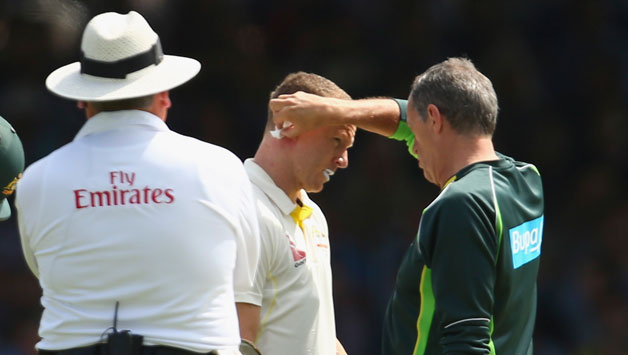
Cricket Country Staff
Editorial team of CricketCountry.
Written by Cricket Country Staff
Published: Jul 22, 2015, 06:47 PM (IST)
Edited: Jul 22, 2015, 06:47 PM (IST)


David Warner revealed that he got worried for his teammate and Australian opener Chris Rogers, who felt dizziness during the second Ashes Test at Lord’s, thought the grandstand was moving. Rogers, who was hit by a bouncer from English pacer James Anderson on the second day of the second Test, escaped a serious damage as he had worn the new clip-on helmet and is expected to feature in the third game starting July 29 at Birmingham. READ: Cricket Australia to recommend clip-on helmet after Chris Rogers incident
According to a report from Sydney Herald, Warner came down the wicket and had to look twice to understand what was happening. Before narrating the seriousness of the situation, Warner joked that with all the talk about both the batsmen not getting along; Warner thought that his teammate didn’t want to talk to him.
“I just let him go for a little bit. He actually said to me ‘the grandstand is moving’ and I said ‘no it’s not’. I was worried. I had no idea what was going on. He said ‘I don’t know what’s happening’ here so I said ‘just sit down’.” READ: Australia levelling an Ashes series in the second Test after losing the first
However, Australia’s team doctor Peter Brukner said after the opener underwent initial scans in London, it was known that the dizziness was more likely to be a delayed problem with his ear and not the result of the bouncer hitting him.
“The initial scans have cleared him of any serious damage and we await the results of further tests. It appears the most likely diagnosis is a delayed ear problem related to being struck on day two of the Test match. We are confident that this is something we can manage in the lead up to the third Test at Edgbaston,” Brukner said.
This website uses cookies so that we can provide you with the best user experience possible. Cookie information is stored in your browser and performs functions such as recognising you when you return to our website and helping our team to understand which sections of the website you find most interesting and useful.
Strictly Necessary Cookie should be enabled at all times so that we can save your preferences for cookie settings.
If you disable this cookie, we will not be able to save your preferences. This means that every time you visit this website you will need to enable or disable cookies again.
